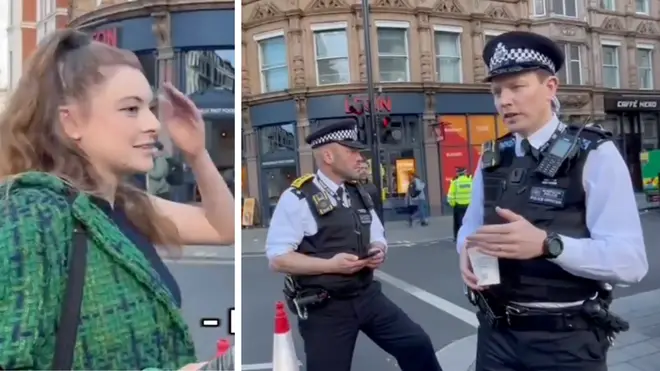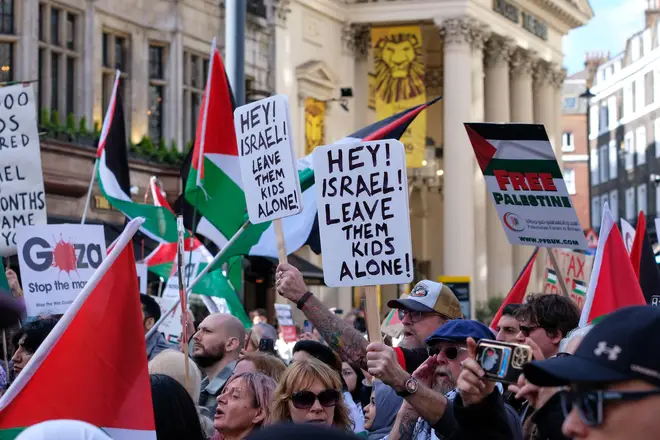
Rachel Johnson 7pm - 10pm
31 March 2024, 11:42 | Updated: 31 March 2024, 22:33

This is the shocking moment a Met Police officer told a Jewish woman that swastikas 'need to be looked at in context' after she claimed she saw them at a pro-Palestine protest in London.
The woman told police that she saw the Nazi symbol being displayed on banners during a march in London over the weekend.
She claims she was told that displaying a swastika was "not necessarily anti-Semitic" nor "a disruption of public order".
The furious activist asked the police officer in what context a swastika could not be seen as anti-Semitic.
The officer replied: "I didn't say it was or it wasn't."
A second Met Police officer also interrupted to say: "A swastika on its own, I don't think is..."
Despite the concerning scenes, the Met Police have confirmed that no disciplinary proceedings have been launched into the officers.
The force also confirmed that the man who was carrying the placard was arrested.
When the @metpoliceuk refuse to arrest Hamas supporters with a swastika sign today in London one officer told a girl that swastikas disturbing public order “depends on context”
— Emily Schrader - אמילי שריידר امیلی شریدر (@emilykschrader) March 30, 2024
If you’re holding a sign with a swastika at an anti-Israel march — this is blatantly antisemitic. Come… pic.twitter.com/MjDNnHomnv
During the interaction, the officer also explained: "There are various facets to the Public Order Act ok. So what in this sphere we're working under things called Section 5 of the Public Order Act and Section 4A of the Public Order Act.
"They are some of the primary legislation we're using right.
"If you go away and look at that and it's all about if it's something likely to cause vast alarm and distress if it is written words or there's spoken words that are abusive."
When pressed about how the swastika could be seen as not being anti-Semitic, the officer said: "I don't have an in depth knowledge of signs and symbols.
"I know the swastika was used by the Nazi party during their inception and the period of them being in power in Germany in 1934... I'm aware of that."
Susan Hall, Conservative candidate in May's London mayoral election, slammed the Met for the interation.
Ms Hall said: Susan Hall: "Antisemitism is unacceptable in any context and the police need to be far more robust in rooting this out at protests.
"I am listening to Londoners who are telling me they do not feel safe, which is why I will put more police on the beat, bring back borough-based policing and give the police the backing to enforce the law and stop hate crimes at these protests."
Sadiq Khan has been approached for comment in relation to the footage - but has previously called for Londoners "to come together to stop hate crimes".
He added that police would "take a zero tolerance approach".
A spokesperson for Campaign Against Antisemitism labelled the interaction "absolutely gobsmacking".

They told MailOnline: "The very notion that a British police officer could imagine a context in which the Nazi swastika is an acceptable image to be displayed in public is distressing enough, but for him to be uncertain about its meaning in the context of a march oozing with anti-Semitic rhetoric and signage is an indictment of the Met.
"This is less the fault of a solitary officer than it is of Met Commissioner Sir Mark Rowley, who has bent over backwards to rationalise and 'contextualise' calls for violent Jihad and genocidal chanting.
"If Sir Mark disagrees with this officer's assessment, he should come out and say so and explain what training he will provide to his officers to ensure that they are clear that Nazism is bad."
A Met Police spokesperson said: "We’re aware of an online clip from today’s protest in central London showing an interaction between an officer and a woman during which there is an exchange over concern around protestors displaying offensive banners, including swastikas.
"The online clip is a short excerpt of what was a 10-minute conversation with the officer.
"During the full conversation, the officer establishes that the person the woman was concerned about had already been arrested for a public order offence in relation to a placard.
"The officer then offered to arrange for other officers to attend and accompany the woman to identify any other persons she was concerned about amongst the protestors, but after turning to speak to his supervisor, she then unfortunately left."